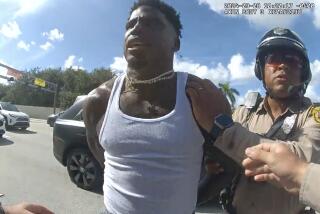Miami Officer Sentenced to 7 Years in Deaths of 2 Blacks
- Share via
MIAMI — Police officer William Lozano, found guilty of manslaughter last month in the deaths of two black men in the city’s Overtown section, was sentenced Wednesday to seven years in prison. The deaths in January, 1989, touched off three days of rioting, and have inflamed tensions between blacks and Latinos ever since.
The sentence was the minimum provided for under state guidelines, and was greeted by smiles from Lozano and his defense counselors and whoops of joy from his supporters, who filled the hallway outside the courtroom, flashing the victory sign and even waving Colombian flags. Lozano, 30, is a native of Colombia.
In passing sentence, Dade Circuit Judge Joseph Farina rejected the prosecution’s recommendation that Lozano be given 12 years in prison, 10 less than the maximum possible.
Nonetheless, Assistant State Atty. John Hogan, chief prosecutor on the case, said he was satisfied. “Seven years in prison is a long time,” he said. “I think that’s fair.”
Lozano, who has been off the police payroll and will be stripped of his badge, remains free on $10,000 bond, in the custody of one of his two brothers, also police officers, while his conviction is appealed. The appeals could take years.
Lozano was found guilty by a jury Dec. 7 of deliberately firing his Glock 9-millimeter semiautomatic service pistol at an oncoming motorcycle being driven by Clement Lloyd, 23. A bullet tore into Lloyd’s head, killing him and causing the motorcycle to hurtle into the path of a car. Allan Blanchard, 24, a passenger riding behind Lloyd, died of head injuries the next day.
The shooting occured on Dr. Martin Luther King Jr.’s birthday, and set off paroxysms of rage in the black community. Two other highly publicized killings of black men by Miami police earlier in the 1980s also led to rioting.
The sentencing of Lozano followed a long day in the courtroom in which the judge first heard from relatives of the victims. Adina Lloyd, Clement Lloyd’s mother, told the court that “Lozano made a wrong move when he fired at my son. If my son did it to him, my son would have been behind bars.”
In asking for a stiff sentence, prosecutor Don Horn told Farina, “I think the defendant’s testimony and the (defense) case was based on lies. The message the sentence needs to send . . . (is) you can’t execute someone just because they’re speeding.”
The case against Lozano turned on his split-second decision to fire at the motorcycle, which was being chased by another police officer after a traffic violation. Lozano, who with his partner had stopped on an Overtown street to take a report on another matter, said he was unaware of the chase in progress, never heard the motorcycle coming, and fired out of fear of being run down and killed.
But the jury didn’t believe him.
“This case,” Judge Farina said before handing down the sentence, “involves tragic consequences for all concerned.”
Defense attorney Roy Black began the day with a motion for re-trial that became a pointed attack on the judge’s handling of the case. In reference to the highly charged atmosphere of racial tension in which the trial was held, Black told Farina: “It is not the job of our courts to do social engineering to prevent riots in our community. The job of the courts is to dispense justice fairly.”
In particular, Black said that Farina’s decision to overrule his preemptory challenge to unseat a black juror named Ezra Simmons was “a perversion of justice.” Black charged that Simmons was “prejudiced against Hispanics and particularly the police.” Simmons, a union official who became foreman of the jury, is sure to be central in Black’s appeal.
Black also criticized the court’s ruling that prohibited the jury from hearing evidence that Blanchard had traces of marijuana in his blood, and that Lloyd had previously been arrested on drug charges. “Mr. Lloyd was a drug dealer,” Black said.
Also speaking Wednesday before sentencing were Lozano’s parents, his wife, Ana, also a Miami police officer, and the heads of several police organizations. Awaiting the verdict outside the courthouse were more than a dozen off-duty police officers, some of whom wore blue T-shirts that depicted a handcuffed, blindfolded policeman over the words: “Now go out and fight crime.”
There was little reaction from the black community in the hours immediately following the sentencing. But representatives of the county’s Community Relations Board were fanning out to various parts of the city as dusk fell, and the Miami and Dade County police forces remained on “field force alert.”
“People were prepared,” said Willie Sims, coordinator of the CRB. “There are a few people who are a little distraught, who feel it was a light sentence, that some preferential treatment was shown.
“But a majority of people (in the black community) were aware that the sentence would be near the low end.”
BACKGROUND
Police officer William Lozano was investigating a domestic disturbance in Miami’s predominantly black Overtown section last January when motorcyclist Clement Lloyd roared down the street, being pursued by a patrol car for a traffic violation. Lozano stepped into the street in an attempt to halt the chase, then fired in what he later contended was self defense. Lloyd was hit in the head and died instantly. His passenger, Allan Blanchard, was fatally injured in the subsequent crash. Both victims were black, and the shooting set off three days of rioting.
More to Read
Sign up for Essential California
The most important California stories and recommendations in your inbox every morning.
You may occasionally receive promotional content from the Los Angeles Times.













